Ben Donaldson’s inclusion was the eye-popping selection in Eddie Jones’ first Wallabies squad, but it wasn’t shocking. Perplexing perhaps given his underwhelming Super Rugby campaign, but not shocking.
After all, ever since sensationally being parachuted in as Wallabies coach Jones has continually namedropped Donaldson at every turn.
And with Andrew Kellaway set to miss the Test after an injury, Donaldson’s ability to cover fly-half and fullback was always a tempting option.
Too tempting in the end, particularly with Quade Cooper still to prove his body can withstand the physical onslaught coming his way and Carter Gordon the standout Australian fly-half in Super Rugby this season but untried at the international level of the game.
Had Donaldson not been selected, Bernard Foley all but certainly would have been included. But for what purpose? To carry the drinks and hold the tackle bags?
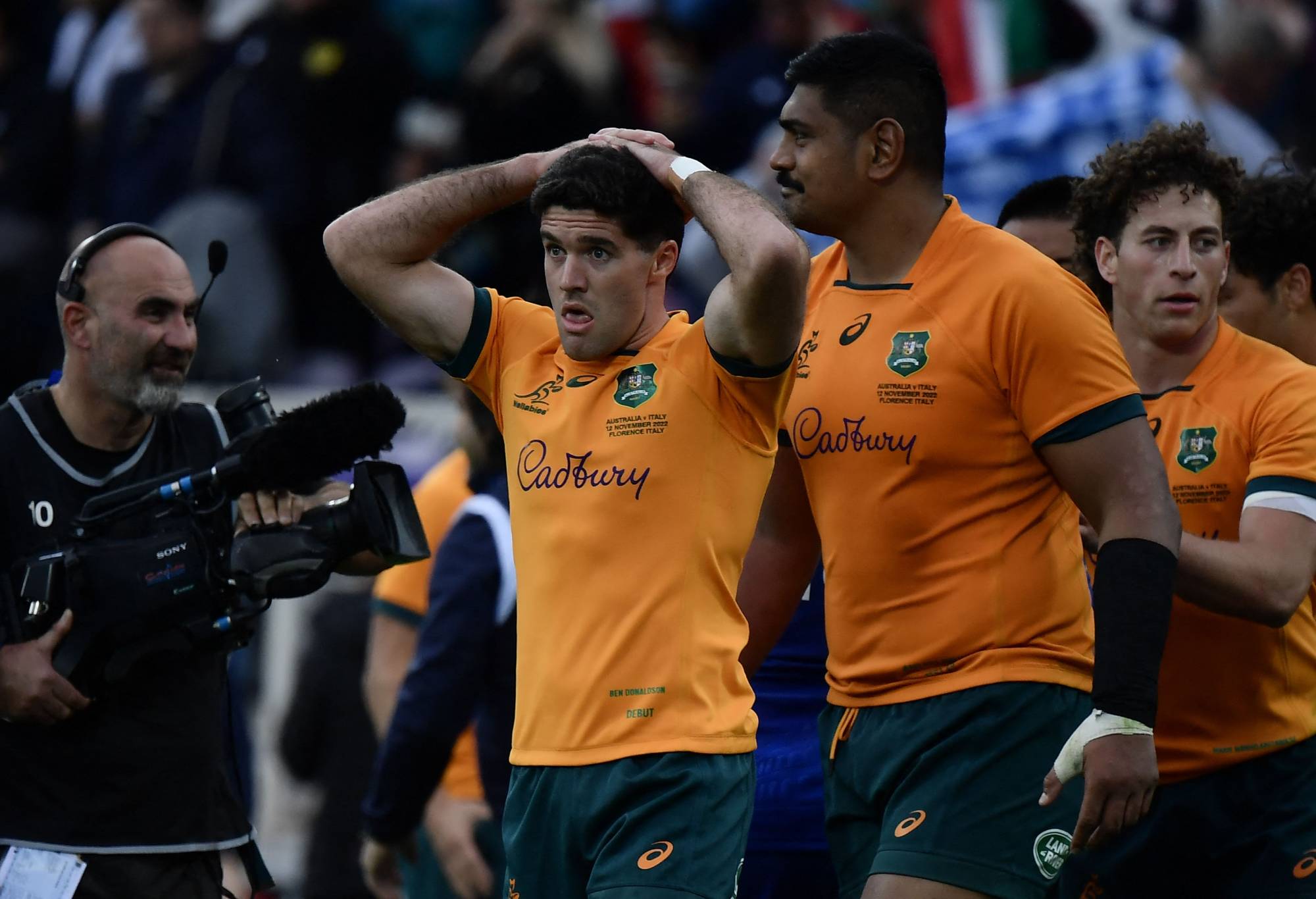
Utility back Ben Donaldson (C) was included in the Wallabies’ squad despite an underwhelming campaign. (Photo by Filippo MONTEFORTE / AFP) (Photo by FILIPPO MONTEFORTE/AFP via Getty Images)
Jones, for now, wants to see how Gordon and Donaldson go without another experienced campaigner like Foley in the mix. But this isn’t the end for the 33-year-old, who has been to two World Cup campaigns.
Nor was the co-captaincy model Jones enacted surprising either.
In March, Jones quipped that he might need to name seven captains because of World Rugby’s policy regarding concussion and Head Injury Assessments. His comments were likely influenced by the fact he had to appoint numerous England captains in 2022 as injuries hit hard.
What was surprising is that Jones has returned to Hooper as one of his co-captains despite his obvious courageous nature and leadership capabilities.
Four successive Wallabies coaches have turned to Hooper to lead the side. That tells you plenty about Hooper’s pedigree as a person and a player, with the openside flanker the nation’s most-capped captain (68 Tests).
Yet, his winning percentage of 41 per cent – one percentage point lower than the Wallabies’ win-loss ratio since 2016 – as captain is the worrying record that should have seen Jones turn to someone new.
After all, losing has become an infectious disease in Australian rugby.
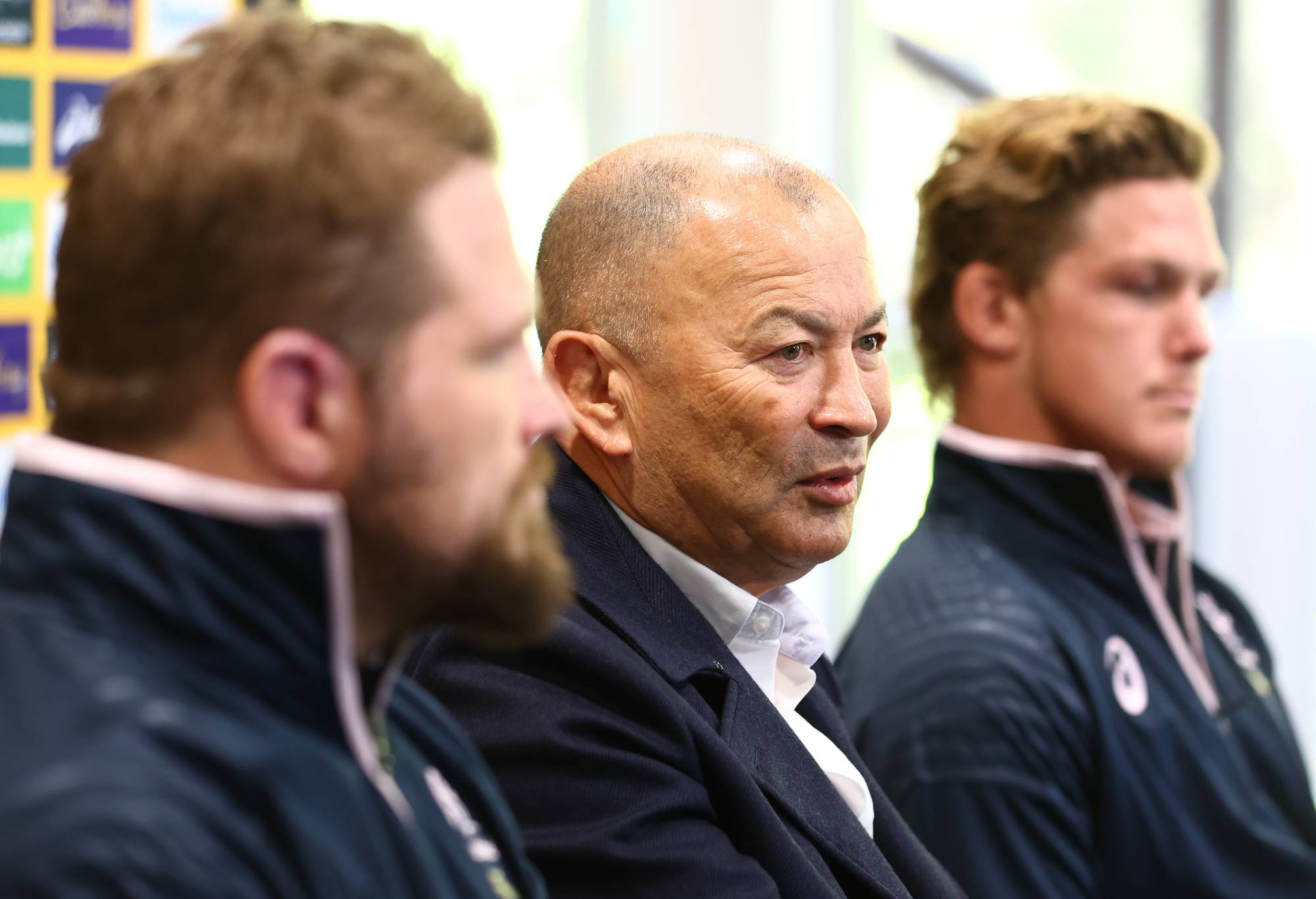
Wallabies head coach Eddie Jones has named Michael Hooper as a co-captain along side James Slipper, but should he have moved away from the veteran leader? (Photo by Chris Hyde/Getty Images)
That’s not necessarily down to Hooper, but fresh ideas were needed to spark the Wallabies. Indeed, for too long the rest of the Wallabies have looked for Hooper to provide the answer.
When Scott Robertson took over from Todd Blackadder as Crusaders coach, the Super Rugby juggernaut had failed to win the competition seven years despite going close on a number of occasions.
Robertson, who will take over from Ian Foster as All Blacks coach following the World Cup, made one crucial change immediately.
“Look, they’d been close,” Robertson told this reporter last year. “But they hadn’t won moments in games.”
Sound familiar?
“The first thing I did was put Sam Whitelock as captain. That was a big decision,” Robertson continued.
“Sam Whitelock came in and left his mark on the group for the first three years as captain; an incredible leader.”
The move paid off, with the Crusaders winning seven Super Rugby titles under Robertson.
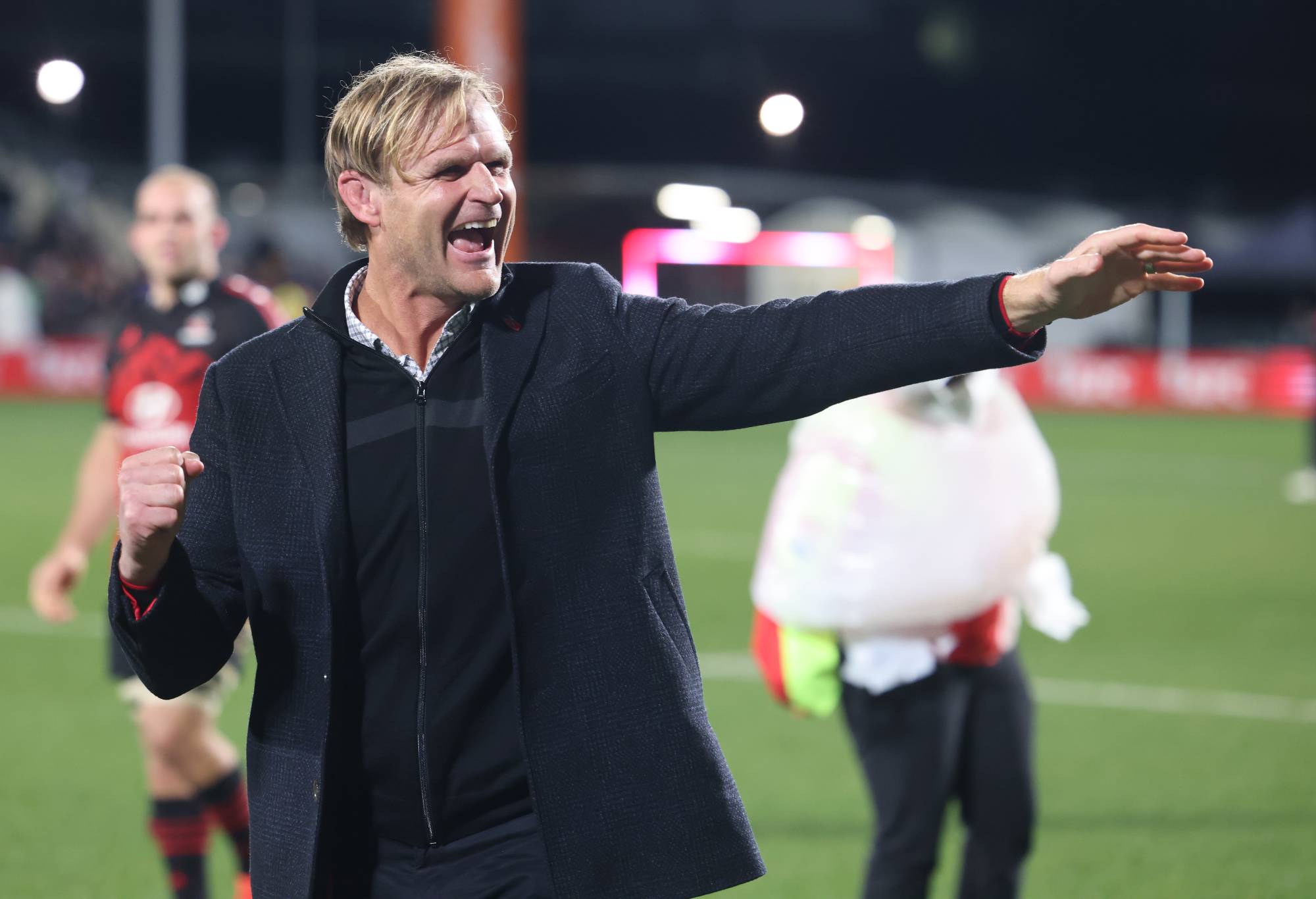
Scott Robertson’s decision to switch captains after being appointed as Crusaders coach paid off. (Photo by Peter Meecham/Getty Images)
Jones’ decision to return to Hooper, who stepped away from the game last August and missed six Tests, is all the more surprising given he has rarely shied away from making a big call.
When he was announced as England coach, Jones named Dylan Hartley, the nation’s grubbiest player in its history with a disciplinary record that saw others bid him goodbye, as captain.
The move paid off, as England won their first 17 Tests under Jones to equal the tier-one record.
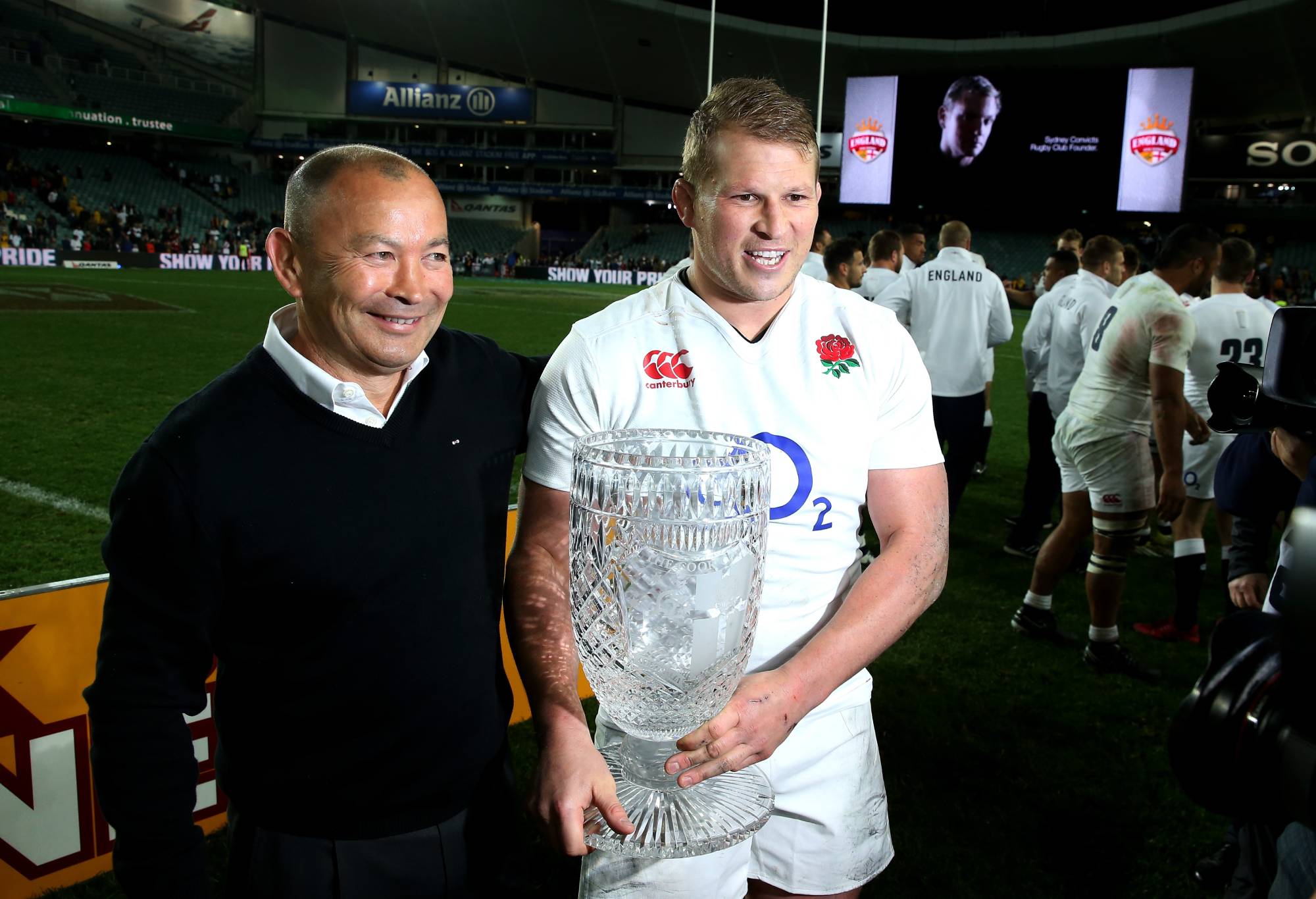
Eddie Jones’ controversial decision to appoint Dylan Hartley(R) as England captain paid off. (Photo by David Rogers/Getty Images)
Then there’s the matter of whether Jones has snookered himself by appointing Hooper as captain?
It was more than two decades ago that Jones chose Brett Robinson ahead of the emerging George Smith for the Brumbies’ Super Rugby final against the Crusaders. That was despite Smith shining all season.
Jones, it is understood, regretted the decision as Smith, arguably the Wallabies’ greatest openside flanker, almost got the Brumbies home after coming on in the second half.
This was Jones’ chance to give himself freedom.
While Dan Carter showed in 2015 that big players can stand up in big moments and rally again for another surge, Hooper’s ineffectiveness at the breakdown should have been enough for Jones to not box himself into a corner by naming him as a co-captain along with James Slipper.
For years Hooper could do it all as he ran from one tackle to the next, papering over the cracks of his teammates because of his superior work-rate and huge engine, but all that did was mask his flaws at the breakdown.
Jones, for now, believes the co-captaincy model will best serve the Wallabies and provide them with a “winning edge”.
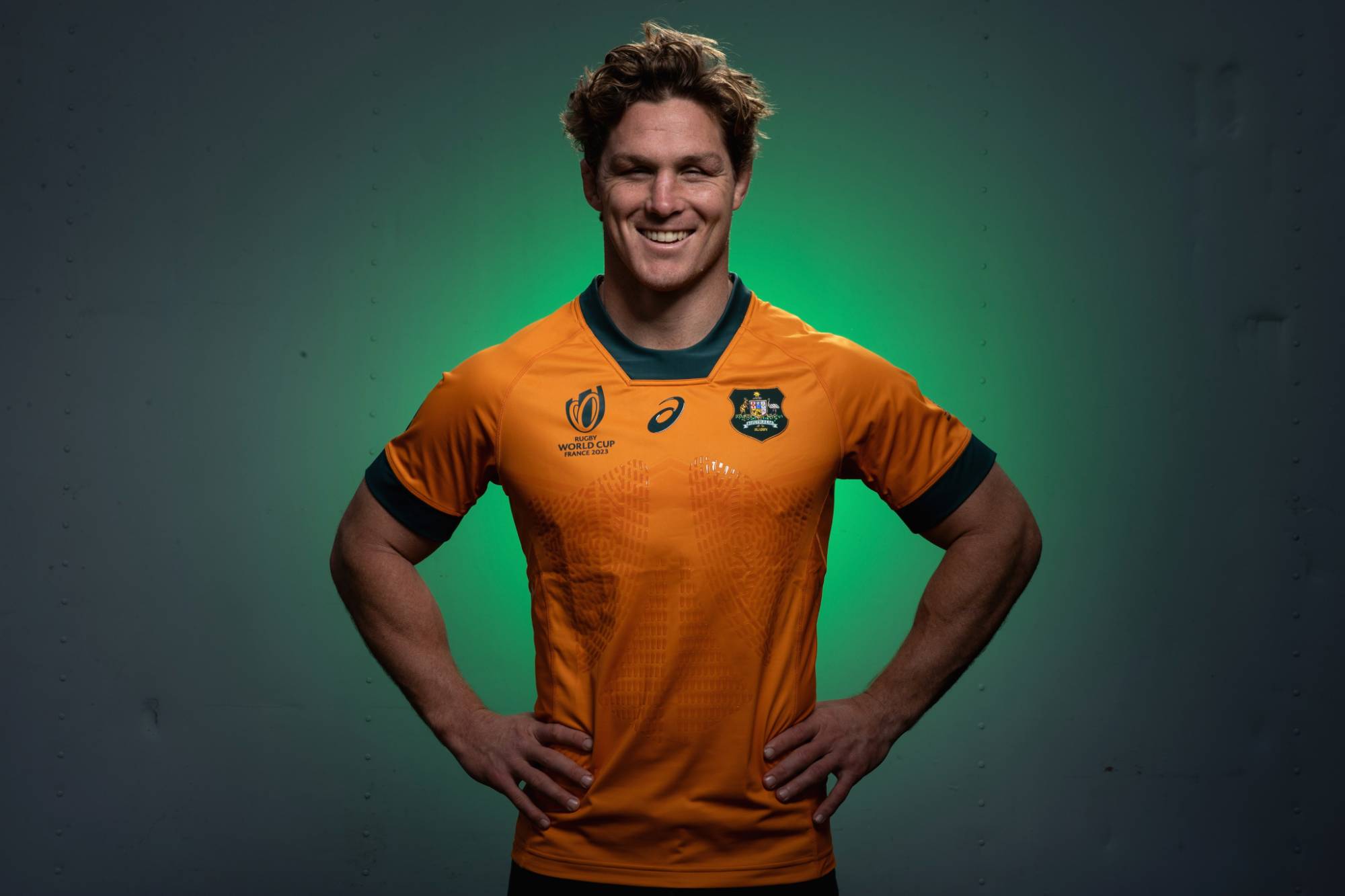
Michael Hooper is the Wallabies’ most-capped captain. (Photo by Cameron Spencer/Getty Images)
The proof will be in the pudding, but if the Wallabies are bundled out at the quarter-final stage with the runway they’ve been served up to make a run to the semi-finals, the captaincy decision will be one of the reasons why.
After all, this is a squad with potential written right the way through it.
Other than Donaldson’s fortune, this was a predictable squad that has been given some X-factor quality to it by Rugby Australia’s smart decision to allow twin towers Will Skelton and Richie Arnold to suit up in gold.
The selections of Quade Cooper, Marika Koroibete and Samu Kerevi, who is still in the reckoning to run out in Pretoria despite being listed in the Wallabies rehab group, give Jones’ side more than a chance.
Indeed, they now have the necessary quota of five world-class players needed to win a World Cup, with Taniela Tupou, Skelton, Cooper, Kerevi and Koroibete up there with the very best.
Whether they fulfill their potential remains to be seen, with Tupou and Skelton particularly needing to transfer their domestic deeds over the years onto the international paddock.
Nor does that list include Angus Bell, Allan Alaalatoa, Rob Valetini, Nic White and Len Ikitau, who have been five of Australia’s best performers over the past two years. They are the glue binding the Wallabies together.
Tate McDermott, Mark Nawaqanitawase and Tom Wright give the Wallabies some potency.
Burgeoning Brumbies utility forward Tom Hooper and Rebels loose-forward Josh Kemeny have both been selected on their eye-catching performances this year. It’s likely both won’t make the World Cup squad, but both are astute selections despite coming from a long way back.
The Achilles heel of the squad remains the hooker position.
Jordan Uelese is even more fortunate to make the squad than Donaldson, with the Rebels rake failing to address his throwing inadequacies.
As is often the case with Jones, the Wallabies coach is impressed by the 26-year-old’s physique, which has bought him time. Now, he must run with his reprieve or risk never being sighted again. Ditto, Suliasi Vunivalu.
Jones’ first official Wallabies squad always promised some surprises. He did not disappoint.
But going down the route of co-captains seems a gamble when a new fresh start seemed essential.

































































































